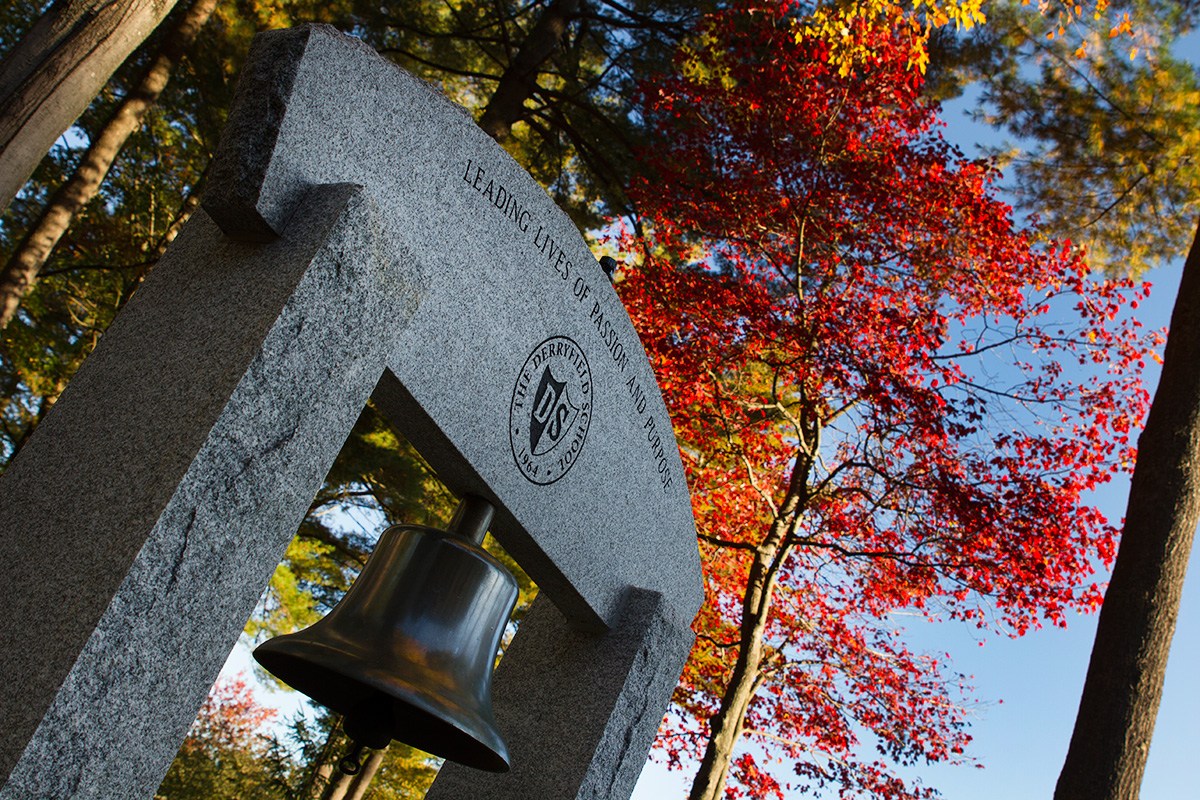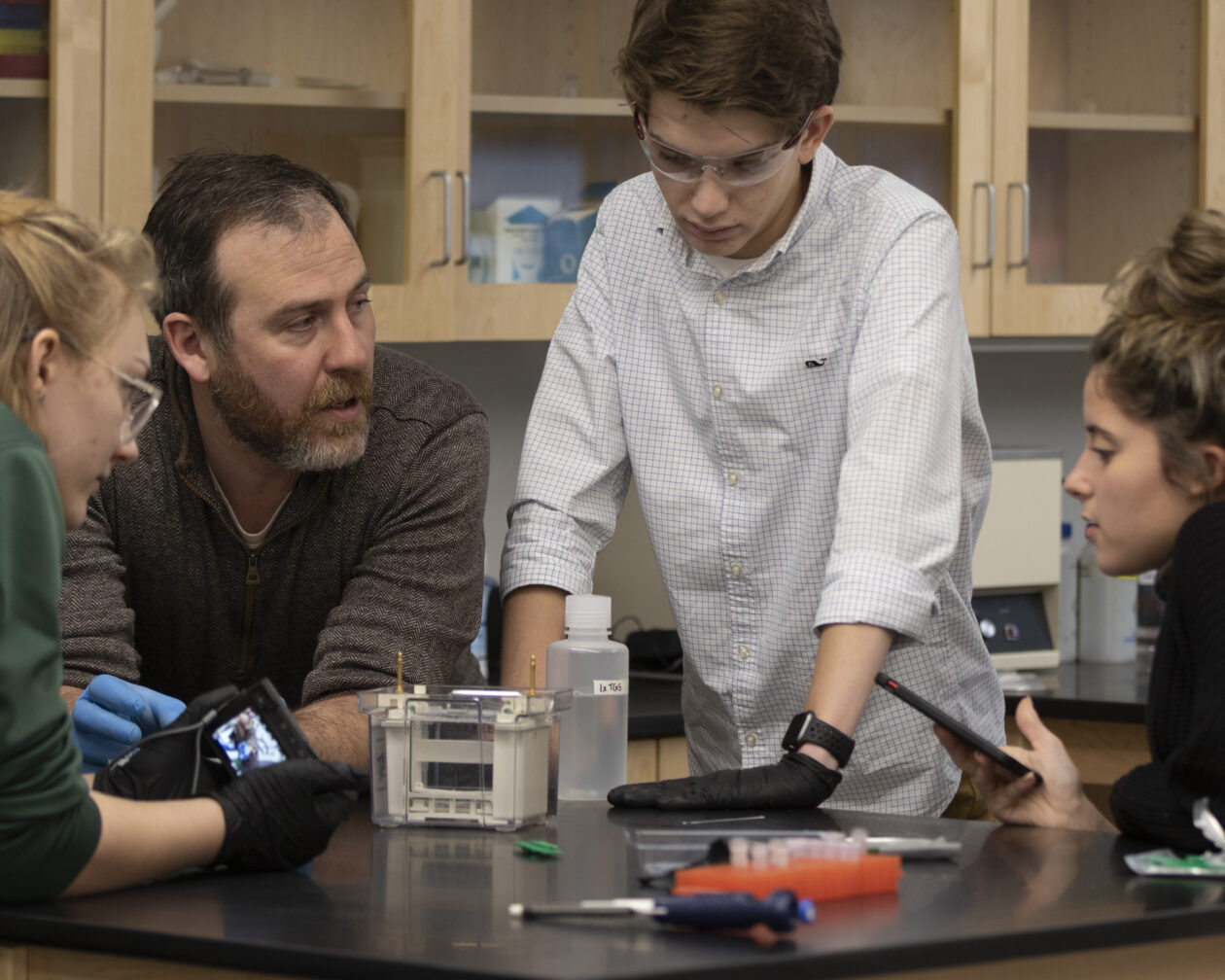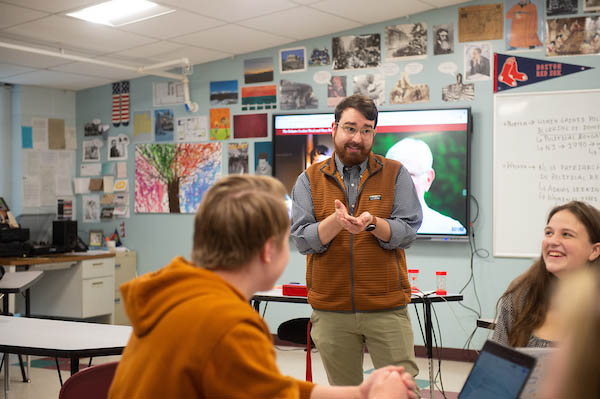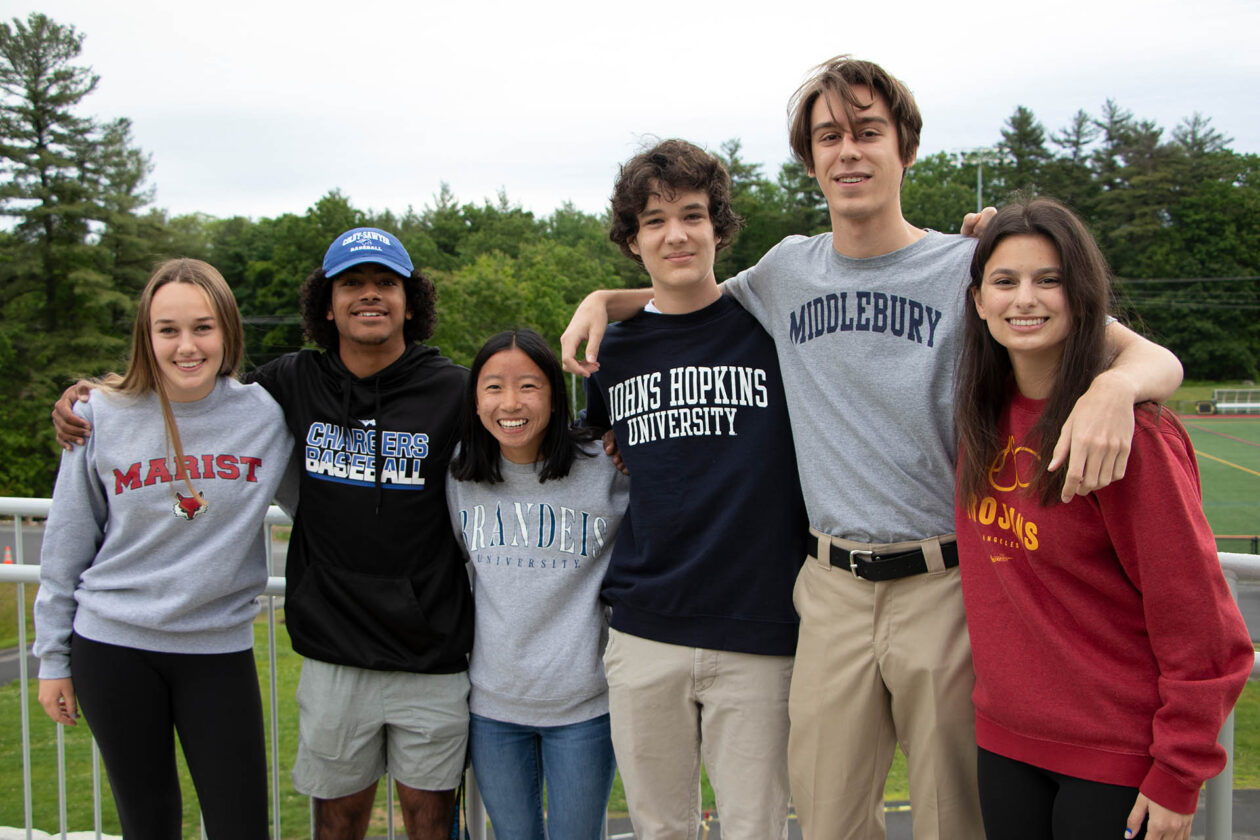Upper School Mathematics
The Philosophy
The primary concern of the Mathematics Department is the development of a student’s ability to think logically and rationally. Regardless of interest, this reasoning is invaluable in nearly any chosen field, as well as in everyday living. We also believe students benefit from a deep understanding of mathematical proofs, facts and concepts, and that logical reasoning provides the path to that understanding. While students need to master some mechanical processes and algorithms to succeed in mathematics, they are encouraged and guided to explore and discover patterns, abstractions, connections, and problem solving strategies that can also be applied to real-world problems. Our program provides students with flexibility to find courses that provide appropriate challenge for their individual capacity.
Algebra I (Year Long)
Prerequisite: Pre-Algebra equivalent and/or Middle School geometry, Mathematics Department Approval
This course begins with a brief refresh of pre-algebra skills, including the order of operations, operations with fractions, negative numbers, and solving simple equations. Algebra I is designed to provide students with a foundation for their progression through the remainder of the Mathematics Curriculum.
Topics of study will include:
- Introduction to variables
- Real number axioms
- Linear equations and inequalities in one and two variables
- Graphing in the plane
- Operations with polynomials
- Factoring
- Laws of exponents including negative exponents
- Linear and quadratic functions
- Irrational numbers
- Quadratic formula
Geometry (Year Long)
Prerequisite: Algebra I or equivalent
The Geometry course is designed to continue the student’s transition from concrete to abstract reasoning. It begins with a thorough review of geometry’s foundational elements, encouraging students to apply geometric and algebraic principles through interactive hands-on, inquiry-driven, and proof-centered activities. We cultivate problem-solving, reasoning, justification, and proof skills by delving into the intricacies of shapes and their properties, exploring rigid transformations, congruence, and the correlation between similarity and right triangle trigonometry.
Topics of study will include:
- Angles in the plane
- Parallel and perpendicular relationships
- Congruent triangles
- Quadrilaterals and regular polygons
- Similar triangles
- Special triangles
- Circles and angles in circles
- Constructions
- Coordinate geometry
- Areas of polygons and circles
- Deductive proof and applications to three dimensions emphasized throughout
- Trigonometry of right triangles
Algebra II (Year Long)
Prerequisite: Algebra I and Geometry or equivalent
Our Algebra II course focuses on the study of functions, including linear, quadratic, exponential, logarithmic, rational, and higher degree functions. This curriculum is designed to nurture skills in graphical, analytical, verbal, and numerical analysis, essential for adeptly navigating and manipulating a range of functions.
Topics of study will include:
- Linear equation and inequalities in 1, 2, and 3 variables
- Irrational numbers and radical expressions and equations
- Complex numbers
- Techniques for solving polynomial equations
- Exponential and Logarithmic functions, equations, and properties
- Rational expressions and equations including negative exponents
Algebra II Honors (Year Long)
Prerequisite: Geometry
This course begins with a quick review of Algebra I, moves to linear functions, and rapidly progresses through the Algebra II curriculum. It is designed for motivated students who are ready to work through material at a quick pace in preparation for advanced mathematics offerings. Group work is a major component of the course and students are expected to take significant personal responsibility for their own learning.
Topics of study will include:
- Foundations from Algebra I
- Linear Functions
- The Graphs of The Basic Functions
- Systems of Linear Equations and Inequalities
- Polynomial Algebra
- Factoring
- Quadratic Functions
- Rational Functions
- Exponential Functions
- Inverse Functions
- Logarithmic Functions
- Roots and Radicals
- Conic Sections
Precalculus (Year Long)
Prerequisite: Algebra II or Algebra II Honors
In this course, we will explore a variety of topics that reinforce prior mathematical skills and understanding, and prepare students for more advanced mathematics courses, Calculus in particular. For an appetizer, we begin with some review of algebra and the function concept, including equation solving and function composition. The main course of the meal is trigonometry, as we advance from triangular trigonometry to circular trigonometry. We enjoy dessert towards the end of the year with some discrete mathematics, probability, and an exploration of conic sections.
The emphasis throughout is using the exercise and reinforcement of mechanical skills to achieve deeper understanding of the connections to other parts of mathematics and other fields of study. Success in this course requires practice and preparation.
Topics of study will include:
- Functions including compositions and inverses
- Polynomials with factor theorem and rational roots theorem
- Review of exponential and logarithmic functions
- Trigonometric functions and their inverses
- Solving equations involving trigonometric functions
- Trigonometric identities and proofs
- Solving triangles using the Laws of Sine and Cosine
- Sequences and series
- Probability and combinatorics
- Conic sections
Precalculus Honors (Year Long)
Prerequisites: Algebra II or Algebra II Honors
Honors Precalculus covers the same topics as the Precalculus course but it covers the material in greater depth, at a faster pace, and at a greater level of abstraction. Additional topics like polar coordinates and matrices are covered to enhance the depth and rigor of study. Honors Precalculus is a fast-paced course intended for highly-motivated students who have demonstrated an enthusiasm for math. The expectations and workload placed on the students are much higher than in Precalculus. This higher expectation of work, quality, and depth of ideas will directly challenge students’ conceptual understanding of higher-level mathematics.
Topics of study will include:
- Transformations of functions
- Composition of functions
- Inverse functions
- Polynomial and rational functions
- Exponential and logarithmic functions
- Trigonometric functions
- Analytic trigonometry
- Combinatorics and probability
- Sequences and series
- Conic sections
- Matrices
Calculus (Year Long)
Prerequisite: Precalculus
This course provides students with an intuitive approach to the fundamentals of differential and integral calculus. Focusing on functions, students explore limits, leading to the definition of derivative. The concepts of average and instantaneous rates of change are investigated. We develop the rules of differentiation, including the chain rule and implicit differentiation, and apply them to problems in optimization, related rates, and curve sketching. We introduce the concepts of finding area under a curve, the integral regarded as the antiderivative, and the Fundamental Theorem of Calculus. Applications of integration are included.
Topics of study will include:
- Limits and continuity
- Derivatives including the chain rule and implicit differentiation
- Applications in curve tracing, related rates, and optimization problems
- Integration including area approximation and the substitution method
- The fundamental theorems of calculus
- Analytic and graphical solutions of simple differential equations (if time allows)
It is important to note that Calculus does not create a pathway to AT Calculus II; after completing this course, students may advance to AT Calculus I, Statistics, AT Statistics, Software Design with Java, AT Software Design with Java or AT Investment Math.
Advanced Topics Mathematics: Calculus I (Year Long)
Prerequisite: Precalculus
AT Calculus I offers a rigorous study of differential and integral calculus at a college level. Success in Calculus is highly dependent on strong mechanical skills with algebra and trigonometry. That said, our goal in mastering these skills is to go beyond and recognize deeper patterns and abstractions relating to rates of change. This course is a prerequisite to Advanced Topics Mathematics: Calculus II.
Topics of study will include:
- Limits and continuity
- Limit definition of the derivative
- Derivatives of algebraic and trigonometric functions
- Chain rule, implicit differentiation
- Applications in curve sketching, related rates, and max-min problems
- Continuity and the mean value theorem
- Approximating areas with rectangles or trapezoids
- Integration and Riemann sums
- The fundamental theorems of calculus
- Calculus of circular functions, exponential and logarithmic functions
Advanced Topics Mathematics: Calculus II (Year Long)
Prerequisite: AT Calculus I
What skills, habits of mind, and experiences are needed to be an effective mathematician in the 21st century? How can theory, application and modern technology help us answer this question? In this Advanced Topics Calculus course, we will develop a framework for advanced theoretical understanding and application of calculus, and how to apply calculus in fields of study such as engineering, physics, biology, and economics.
Topics of study will include:
- Volumes of revolution and of a known base
- Improper integrals
- Conic sections and the general second degree equation
- Calculus of parametric, polar, and vector functions
- L’Hôpital’s rule and its application to convergence of improper integrals and sequences
- Integration by parts and partial fractions
- Application of integrals to area, volume, length of curve, and surface area
- Analytic solution of variable separable and logistic differential equations
- Solution of differential equations graphically by slope fields and numerically by Euler’s method
- Infinite series of numbers; tests of convergence
- Power series, Maclaurin and Taylor series with Lagrange remainder
Statistics (Year Long)
Prerequisite: Precalculus
This course includes three major areas of emphasis: data collection, data description, and data analysis as described below.
Topics of study will include:
- One-variable statistics: measures of central tendency and variability
- Graphs—histogram, box plot, dotplot, stemplot, normal quantile plot
- Two-variable statistics—measures of linearity and transformation to linear graphs
- Scatterplot, residual plot
- Surveys
- Bias
- Types of sampling
- Comparative experiments
- Probability and probability distributions, including binomial and geometric distributions
- Normal density curves
- Sampling distributions and the Central Limit Theorem
- Hypothesis tests and confidence intervals for means and proportions
- Power of a test, Type I and Type II errors
Advanced Topics Mathematics: Statistics (Year Long)
Prerequisite: Precalculus
AT Statistics coursework includes three major areas of emphasis: data collection, data description, and data analysis as described below. The course covers many of the same subjects in Statistics, but at greater depth and a faster pace. Instruction is more inquiry-based, and students complete a major project to conclude the course.
Topics of study will include:
- One-variable statistics: measures of central tendency and variability
- Graphs—histogram, box plot, dotplot, stemplot, normal quantile plot
- Two-variable statistics—measures of linearity and transformation to linear graphs
- Scatterplot, residual plot
- Survey Bias
- Types of sampling
- Comparative experiments
- Simulations
- Probability and probability distributions, including binomial
- Normal density curves
- Sampling distributions and the Central Limit Theorem
- Hypothesis tests and confidence intervals for single means and proportions as well as differences between two means or two proportions
- Chi-squared analysis of categorical data
- Power of a test, Type I and Type II errors
Advanced Topics Mathematics: Investment Math (Year Long)
Open to: Grade 12
Prerequisite: Precalculus
This seminar-style course will begin with an exploration of the broader capital markets and an examination of the fundamental principles of investing (time value of money, efficient market hypothesis, risk vs. return, supply/demand dynamics, market cycles, etc.). The focus will then shift to the technical analysis of single security price data as an ideal application of precalculus and other mathematics. Students will be responsible for analyzing a specific stock over the course of the term using the tools developed in the class. Throughout the course, there will be an emphasis on relating current events to the financial markets. The class will explore the power of TradingView’s software. We will learn about some of the many different functionalities that TradingView offers, and we will apply these functionalities to different price series. We will begin to develop our first strategy by optimizing parameters of basic analysis techniques learned in the fall. We will apply an advanced statistical analysis to review our results. Then, we will learn how to code using PineScript. We will then develop hypotheses about what drives the markets and use our ability to code to write algorithmic trading programs that try to capture gains from these observations. We will backtest our programs and evaluate their performance. We will then learn about how to manage a portfolio through the application of many different non-correlated algorithms. Required: a laptop running Windows, Linux, or MacOS. This course is cross-listed with the STEAM Department.
Software Design with Java (Year Long)
Open to: Grades 9-12
This course offers an extensive introduction to computer programming and software design using the Java programming language. There are no prerequisites for this course, but some understanding of basic programming structures, such as the coding topics learned in the Computer Science Practice and Principles LEAD programming course, or the Computer Science elective courses, would be helpful. This course begins with the basic syntax of Java, including variables and types, simple commands, program flow and decision statements, and iterative looping structures. We then proceed to arrays and array lists, exception handling, objects and classes, interfaces, inheritance, and polymorphism, computer graphics, recursion, analysis of algorithms, sorting and searching. While learning the particulars of Java, we focus on more broad-based language and design concepts that apply to other high-level programming languages.
Required: a laptop running Windows, Linux, or MacOS. This course is cross-listed with the STEAM Department.
Advanced Topics Computer Science: Software Design with Java (Year Long)
Open to: Grades 11 & 12
Prerequisites: Permission from the teacher
Embedded in the Software Design with Java course, this advanced topic (AT) course allows students with a stronger interest in computer science to learn the Java programming language. AT students study the same topics as listed for the Software Design with Java course, but cover these topics in greater detail. AT students are also introduced to advanced programming concepts, including numerical methods and simulation, computer animation and game programming, and networking / socket programming. Students also learn practical computer skills and learn how to use modern editing, version control, and debugging tools. No specific prior knowledge is required, but having some programming experience and mathematical maturity are beneficial. AT students are assigned additional reading material and given extra programming assignments and assessments for this embedded class.Required: a laptop running Windows, Linux, or MacOS. This course is cross-listed with the STEAM Department.
STEAM Electives (for Mathematics Department credit)
In some cases, when a student has completed the three credits of math required in grades 9-12, the math department may recommend that a student take a STEAM course as their math credit. The math department believes that, in these cases, the problem solving, design thinking, and critical analysis involved in the STEAM courses is a valuable extension of their math study. Please see the STEAM section of the Curriculum Guide for a complete description. Available courses include:
- STEAM: Engineering Design Process (F, S)
- STEAM: Engineering Alternative Energy (F)
- STEAM: 3D Design (W)
- STEAM: Construction and Architecture (W)
- STEAM: Landscape Design (S)





